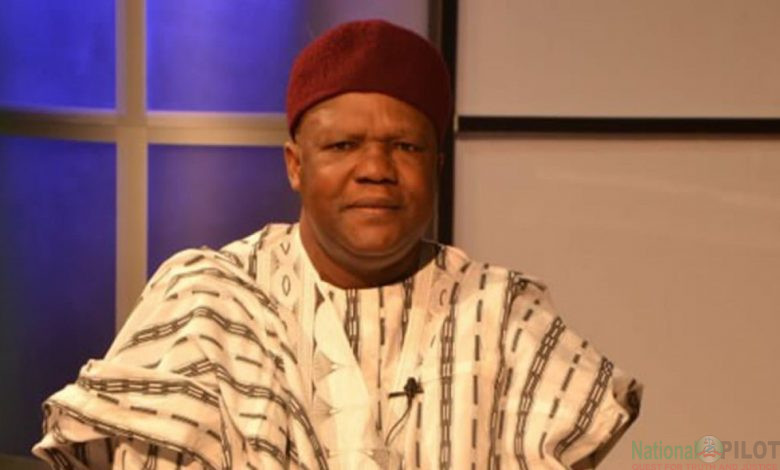Requiem for our departed glory

By Obadiah Mailafia
Nigeria is dying. A dying elephant, encircled by vultures and hyenas. Waiting to feast on the carcass. A fractured, broken nation. The ghost continues to limp aimlessly in the shadows. The question is: Who will bury it?
Every nation is born with a peculiar glory. Britain isn’t the most powerful nation on earth; but its name somehow evokes a certain radiance. Same goes for Japan, Germany, France, Switzerland, Russia and Sweden, to give but a few examples. There is this aura and prestige around some nations that speaks for them more than macroeconomic indices such as GDP, per capita income and external reserves. The very essence of national greatness.
Our glory once irradiated the nations. Nigeria was an illustrious country. Our naira was at par with the pound sterling and was stronger than the American dollar. Our armed forces acquitted themselves with distinction in international peace-keeping operations. When we spoke, the world listened.
Today, alas, the glory has departed. We have become a by-word among the nations notorious for grand larceny, kidnapping, violence and lawlessness. A British Prime Minister described us as a “fantastically corrupt country”. We recently overtook India as the world capital of poverty. Botswana, Rwanda, Ghana, Ethiopia, Egypt, Morocco, Kenya and South Africa enjoy more prestige and command more influence than our country in the councils of the family of nations.
UNICEF recently revealed that more than 345,000 children have died in the North East in the past 12 years. Governor Babagana Zulum has announced that more than 540,000 of Borno citizens have “disappeared”. If in the North East alone, nearly a million have been killed, what would you imagine the figure to be for the rest of the country?
I would say probably a minimum of 500,000. Add to that the people that have perished over decades of ethno-religious carnage since 1970, perhaps 100,000. And if we agree that some three million died during the civil war, the total dead in our country since 1967 number nearly five million. Add to that the more than three million refugees that we have today. No country could survive such a holocaust.
Righteousness exalts a nation while sin is a reproach to any people. The Book of Samuel recounts the story of High Priest Eli and his sons Hophni and Phinehas, custodians of the Ark of the Covenant. The sons were killed in war with the Philistines, who took the Ark of the Covenant into captivity. When the news reached Eli, he fell off his chair, broke his neck and died. His daughter in-law, Hophni’s wife, fell into premature labour and gave birth to a son whom she named Ichabod; meaning: “without glory”, or “where is the glory?” This calamity befell Israel because the watchmen had become gravely corrupted. We are the Ichabod generation.
British historian Arnold Toynbee has identified no less than 26 civilisations that have risen and fallen throughout the long drama of human history. High civilisations were built, according to him, by “creative elites”, through creative adaptation to changing global eco-systems. They also failed because there were no creative elites to steer them through turbulent times. From a purely systems-analytic viewpoint, our system cannot survive this destructive path-dependence of “Islamisation and Fulanisation”. The vast majority of Nigerians will never agree to live under the yoke of a brutal and rapacious theocracy that belongs to the Middle Ages.
During the procession following the coronation of a new Pope in medieval times, thepapal master of ceremonies would mournfully declare: “Pater Sancte, sic transit gloria mundi!” (“Holy Father, so passes worldly glory!”). A reminder that all the pomp and pageantry of this world is temporary. Anyone who plays God in this country will sooner or later eat the dust of his own wickedness. The prayers of the holy ones cannot be toyed with and the blood of the holy martyrs can never be in vain.
American theologian Richard Hollerman reminds us that the rich and powerful nations of today will, like the glory of Greece and the grandeur of Rome, become dead monuments. “The aspirations of modern kings, presidents and potentates, and the designs of contemporary nations and peoples will eventually be destroyed. In His own predetermined time and according to His sovereign will, the Lord God will bring all of this to its end. But the rule of God and the Kingdom of our Lord will last forever.”
In our 21st century, national power is determined by population, territory, landmass, economic prowess, technological capability and military might. National glory is an important, albeit unquantifiable, element, in that equation. National glory is about prestige, national reputation and aura. The French describe it in terms “rayonnement national”or”la gloire nationale”.
The Swiss jurist, Emmerich de Vattel, in his book, The Law of Nations or the Principles of Natural Law (1758), sees national glory as ”the favourable opinion of men of wisdom and discernment; it is acquired by the virtues or good qualities of the head and the heart, and by great actions, which are the fruits of those virtues. A nation may have a two-fold claim to it; first, by what it does in its national character, by the conduct of those who have the administration of its affairs, and are invested with its authority and government; and, secondly, by the merit of the individuals of whom the nation is composed”.
De Vattel sees national glory as being inextricably linked to national power: “A nation whose reputation is well established – especially one whose glory is illustrious – is courted by all sovereigns; they desire its friendship, and are afraid of offending it. Its friends, and those who wish to become so, favour its enterprises; and those who envy its prosperity are afraid to show their ill-will”.
Every occupant of the high magistracy of a republic has a bounden duty to safeguard the glory of his nation: ”A prince, a sovereign of whatever kind, being bound to exert every effort for the good of the nation, is doubtless obliged to extend its glory as far as lies in his power. We have seen that his duty is to labour after the perfection of the state, and of the people who are subject to him; by that means he will make them merit a good reputation and glory….Let him, in all his actions, display justice, moderation, and greatness of soul, and he will thus acquire for himself and his people a name respected by the universe, and not less useful than glorious”.
Indeed, so important is national glory to a country that, when attacked, countries must take steps to avenge it. As de Vattel makes clear: “Since the glory of a nation is a real and substantial advantage, she has a right to defend it, as well as her other advantages. He who attacks her glory does her an injury; and she has a right to exact of him, even by force of arms, a just reparation. We cannot, then condemn those measures, sometimes taken by sovereigns to support or avenge the dignity of their crown”.
Students of power politics, from Thucydides and Machiavelli to Kautilya, Metternich and Kissinger, have defined national power from the viewpoint of military capabilities, and war-making. The Harvard political scientist Joseph Nye has, however, drawn our attention to the idea of “soft power”, which he defines as the ability to “co-opt” rather than “coerce”.
This entails ability to shape the preferences of others through influence, appeal and the power of attraction. A country would tend to have considerable soft power when its culture is considered attractive by others; when its political values are held to be morally upright and when its international policies are regarded as morally legitimate and political progressive.
Funnily enough, Nigeria has a reservoir of soft power emanating from its youth. Nollywood and Nigerian music are making waves across the world. Nigerian students have been shiny ornaments in top Ivy-League institutions. We are a land of geniuses governed by barbarians.
In line with the laws of evolutionary biology, perhaps the Old Nigeria will have to die for the New to be born. Those who saw to the wind will sooner or later reap the whirlwind. The evil men who govern us with such arrogance today belong to the dustbin of history. A New Nigeria will arise from the ashes of the old. She will fulfil her destiny as a progressive, enlightened industrial-technological state anchored on the rule of law, democracy and social justice and liberty.
And all the people shall rejoice together! We shall resume our place as the standard-bearer of African civilisation and as leader and defender of the Black Race throughout the world.
Arise and shine, Nigeria! For your light has come. And the glory of the Lord has risen upon you. For behold, darkness will cover the earth and deep darkness the peoples; but the Lord will rise upon you and His glory will appear upon you!
Mailafia, former presidential candidate and popular columnist, wrote this last article before his death yesterday.





